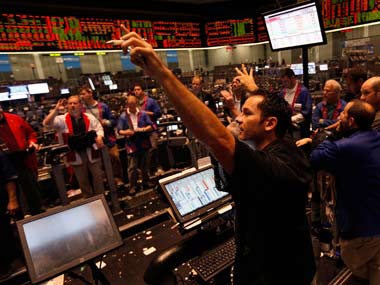London/ New York/ Singapore: Emerging markets may be unrecognisable from the small and fragile economies that fell like dominoes 15 years ago, but they are just as vulnerable today to the same sort of indiscriminate selling when investor panic sets in.
As even the relatively robust economies of Mexico and Poland now feel the heat from disparate flashpoints from Turkey to Argentina, there are growing doubts that emerging markets have built any immunity to such contagion.
The wildfire engulfing the developing world is starting to look very like the currency runs of the past, such as the Asian, Russian and Latin American collapses that began in 1997.
Dominic Rossi, Global CIO for equities at fund manager Fidelity, likens the current wave of plunging currencies, equities and bonds to watching an old film - one in which some of the biggest emerging markets could feature.
[caption id=“attachment_1362451” align=“alignleft” width=“380”]  Representational image. Reuters[/caption]“We’ve seen this movie before,” he said. “One emerging country after another gets left stranded on the shore as the tide goes out. The weakest ones first, Argentina and Turkey, soon to be followed by Brazil, Russia and others.”
Emerging markets have been inflated in recent years by huge amounts of cheap cash created by the U.S. Federal Reserve, much if which found its way into developing economies in the hunt for better returns. With the Fed scaling back the programme, that flow is reversing and the currencies of countries with the biggest economic and political problems - notably Argentina and Turkey - are diving.
Investors’ behaviour may not have changed all that much from during the past crises, even though many emerging economies now have more flexible currencies and trillions of dollars in foreign exchange reserves. There are three main reasons why these markets could again suffer the capital flight that plagued them during the 1990s.
First is the scale of money that has moved to developing markets over the past decade and now dwarfs the sums which fled in panic 15 years ago.
Secondly, lending into emerging markets has increasingly been through bond markets, rather than in the direct bank loans that dominated previously and which involved longer-term relationships between banks and the firms and countries.
Thirdly, the emergence of index-tracking Exchange Traded Funds (ETFs) over the past decade has arguably increased the indiscriminate nature of emerging market inflows, leaving them ever more vulnerable to lockstep withdrawals.
So for all the transformation of emerging economies, their higher credit ratings, superior balance sheets and infrastructure, investors still tend to lump developing countries together when markets sell off, Goldman Sachs CEO Lloyd Blankfein told Reuters Television.
Blankfein said people who carefully weighed one investment against another when entering a market, were much less discriminating when departing in haste.
“When times are good emerging markets are like a credit business, name by name,” he said. “When things get bad, forget the names, it’s a macro event. Forget the differences, they are all emerging markets.”
TIDAL WAVE
Emerging markets have attracted about $7 trillion since 2005 through a mix of direct investment in manufacturing and services, mergers and acquisitions, and investment in stocks and bonds, the Institute for International Finance estimates.
JPMorgan estimates outstanding emerging market bonds at $10 trillion compared with just $422 billion in 1993. Assets of funds benchmarked to emerging debt indices stand at $603 billion, more than double 2007 levels, it said, and over $1.3 trillion now follows MSCI’s main emerging equity index.
Mutual fund data from Lipper, a ThomsonReuters service, shows that in the past 10 years net inflows into debt and equity markets was in the region of $412 billion.
Significantly, there have been few major hiccups in emerging economies in that period, and only in the global crisis year of 2008 and in 2013 were there any net redemptions, Lipper showed.
The result, many say, is a recipe for fund redemptions snowballing when returns fall below a certain level.
Losses in one or two markets can leave managers with no choice but to liquidate other positions to protect the fund’s net asset value (NAV), the main indicator of how profitable a fund is relative to its assets.
But emerging markets’ inherent volatility may have been exacerbated by the explosion in popularity of ETFs, many people believe. Assets of emerging equity ETFs tracked by EPFR Global ballooned to a peak of almost $300 billion, tripling since 2008 and up from next to nothing in 2004.
These cheaper and highly liquid vehicles, unlike mutual funds, update prices through the day, adding another layer of price swings to a volatile trading session.
ETFs accounted for almost half the $2.5 billion outflows from emerging equities last week. So far this year, a net $4.12 billion has flowed out, amounting to three quarters of the total $5.7 billion that has fled, the fund tracker said.
“Just as ETFs helped hot money go in in the boom years, so they’re helping it leave now,” said Tom Elliott, investment strategist at De Vere.
“You need to separate from your long-term investor who is putting emerging markets into a pension fund, and the speculative investor who is looking for more immediate returns and will almost certainly use some measure of stop, such as NAV, both on the way up and on the way down.”
Another channel for contagion that has evolved in recent years is emerging companies’ debt.
Corporate bond sales have exploded since 2010, as companies shifted their borrowing away from syndicated loan markets. While banks don’t face daily liquidity constraints, funds have to cover redemptions daily as investors pull out. This means they may have to sell large bond investments abruptly, increasing the risk of an intense market correction.
DIFFERENTIATION
Innocent bystanders in emerging markets will continue to suffer as investors, spooked by the Chinese economic slowdown, the looming reduction in U.S. stimulus or by emerging markets’ own problems - such as the current political turmoil in Ukraine - yank cash from the sector.
“When the news flow comes through that China is a bit weaker than you thought, you got a downgrade in Argentina and Venezuela, and the rouble was in trouble, you had the Ukrainian situation…that just spooked people so they have withdrawn liquidity and are sitting back and seeing where it falls,” said Gary Dugan, Asia & Middle East CIO at Coutts.
Some markets may benefit eventually, but not for the time being, say investors. While asset prices, from stocks to currencies are starting to look cheap and many economies are fundamentally sound, dipping in a toe now is highly risky.
Policymakers are keen to proclaim the merits of their own countries, with the Mexican and Colombian finance ministers expressing confidence in investors’ ability to differentiate between good and bad emerging markets.
That could take a while, however.
“We are in full-blown financial contagion mode. There is no point spending too much time trying to pick and choose when faced with a severe market crisis like the one we are witnessing,” said Benoit Anne, head of emerging markets strategy at Societe Generale.
He added:
“Right now, sell everything.”
Reuters


)
)
)
)
)
)
)
)
)



